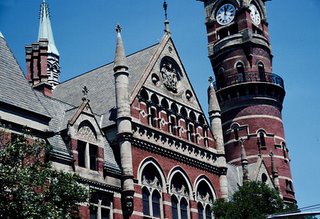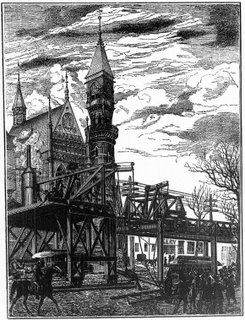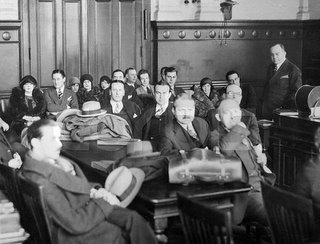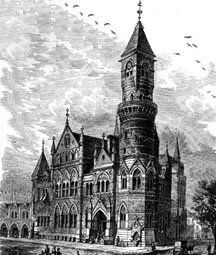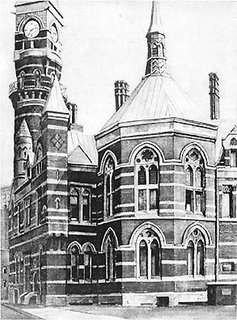Prodigal daughters! Jefferson Market is filled with mostly undocumented memories of the women of the Night Court. Muck-raker Rheta Childe Dorr wrote about them often. Here's an excerpt from her book.
• •
What Eight Million Women Want • •
by Rheta Childe Dorr [1866 - 1948]
Dorr's articles [for
Hampton's Broadway Magazine] were published as a book in
1910.
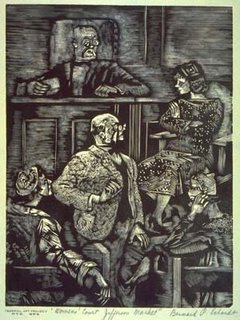
• • The women of the Night Court. Prodigal daughters! Between December, 1908, and December, 1909, no less than 5,000 of them passed through the guarded door, under the blaze of the electric lights. There is never an hour, from nine at night until three in the morning, when the prisoners’ bench in Jefferson Market Court is without its full quota of women. Old — prematurely old, and young — pitifully young; white and brown; fair and faded; sad and cynical; starved and prosperous; rag-draped and satin-bedecked; together they wait their turn at judgment. Quietly moving back and forth before the prisoners’ bench you see a woman, tall, graceful, black-gowned. She is the salaried probation officer, modern substitute for the old-time volunteer mission worker. The probation officer’s serious blue eyes burn with no missionary zeal. There is no spark of sentimental pity in the keen gaze she turns on each new arrival.
• • When the bench is full of women, the judge turns to her to inquire: “Anybody there you want, Miss Miner?”
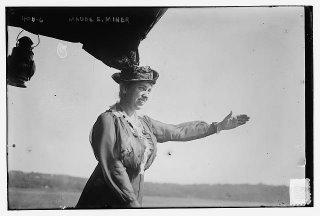
__________________________________
• • Miss Maude E. Miner usually shakes her head. She diagnoses her cases like a physician, and she wastes no time on incurables. Once in a while, perhaps several times in the course of a night, Miss Miner touches a girl on the arm. At once the girl rises and follows the probation officer into an adjoining room. If she is what she appears, young in evil, if she has a story which rings true, a story of poverty and misfortune, rather than of depravity, she goes not back to the prisoners’ bench. When her turn at judgment comes, Miss Miner stands beside her, and in a low voice meant only for the judge, she tells the facts. The girl weeps as she listens. To hear one’s troubles told is sometimes more terrible than to endure them. Court adjourns at three in the morning, and this girl, with the others — if others have been claimed by the probation officer — goes out into the empty street, under the light of the tall tower, whose clock has begun all over again its monotonous race toward midnight. No policeman accompanies the group. The girls are under no manner of duress. They have promised to go home with Miss Miner, and they go. The night’s adventure, entered into with dread, with callous indifference, or with thoughtless mirth, ends in a quiet bedroom and a pillow wet with tears.
• •
Waverley House, as Miss Miner’s home is known, has sheltered, during the past year, over 300 girls. Out of that number 119 have returned to their homes, or are earning a living at useful work.
• • One hundred and nineteen saved out of 5,000 prodigals! In point of numbers this is a melancholy showing, but in comparison with other efforts at rescue work it is decidedly encouraging.
• • Nothing quite like Waverley House has appeared in other American cities, but it is a type of detention home for girls which is developing logically out of the probation system. Delinquent girls under 16 are now considered, in all enlightened communities, subjects for the Juvenile Court. They are hardly ever associated with older delinquents. But a girl over sixteen is likely to be committed to prison, and may be locked in cells with criminal and abandoned women of the lowest order.
• • Waverley House is the first practical protest against this stupid and evil-encouraging policy.
• •
The house, which stands a few blocks distant from the Night Court, was established and is maintained by the Probation Association of New York, consisting of the probation officers in many of the city courts, and of men and women interested in philanthropy and social reform. The District Attorney of New York County, Charles S. Whitman, is president of the Association, Maude E. Miner is its secretary, Mrs. Russell Sage, Miss Anne Morgan, Miss Mary Dreier, president of the New York Women’s Trade Union League, Mrs. Richard Aldrich, formerly president of the Women’s Municipal League, Andrew Carnegie, Edward T. Devine, head of New York’s organized charities, Homer Folks, and Fulton Cutting are among the supporters of Waverley House. Miss Stella Miner is the capable and sympathetic superintendent of the house.
• • The place is in no sense a reformatory. It is an experiment station, a laboratory where the gravest and most baffling of all the diseases which beset society is being studied. Girls arrested for moral delinquency and paroled to probation officers are taken to Waverley House, where they remain, under closest study and searching inquiry, until the best means of disposing of them is devised. Some are sent to their homes, some to hospitals, some to institutions, some placed on long probation.
• • Maude E. Miner, who declined a chair of mathematics in a woman’s college to work in the Night Court, is one of an increasing number of women who are attempting a great task. They are trying to solve a problem which has baffled the minds of the wisest since civilization dawned. They have set themselves to combat an evil fate which every year overtakes countless thousands of young girls, dragging them down to misery, disease, and death. At the magnitude of the effort these women have undertaken one stands appalled. Will they ever reach the heart of the problem? Can they ever hope to do more than reclaim a few individuals? This much did the missionaries before them.
• • “We could reclaim fully 75%,” declares Miss Miner, “if only we could find a way to begin nearer the beginning.”
• • To begin the reform of any evil at the beginning, or near the beginning, instead of near the end is now regarded as an economy of effort. That is what educators are trying to do with juvenile delinquency; what physicians are doing with disease; what philanthropists are beginning to do with poverty. . . .
- - excerpt - -
Reformer
Rheta Childe Dorr [1866 - 1948] was committed to bettering the lives of the poorest and the weakest members of society, namely women and children. Rheta Childe Dorr was a war correspondent, an author, and an advocate of women's equal rights. These chapters began as articles published by
Hampton's Broadway Magazine, which provided a middle ground between investigative magazines [like McClure's] and popular literary periodicals.
__ ___
Source:http://jeffersonmarketcourthouseny.blogspot.com/atom.xml
 Jefferson Market
Jefferson Market• • Illustration: •
Women's Court Jefferson Market [wood engraving]• Bernard P. Schardt [1904-1979]
• • Photo: MAUDE E. MINER, Probation Officer [undated]
NYCNew York Public LibraryJefferson Market.

